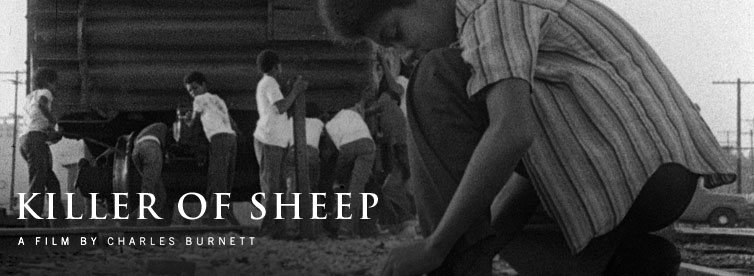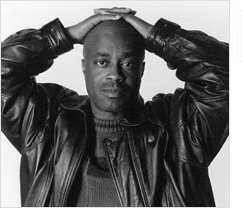
THE WRITER/DIRECTOR,
CHARLES BURNETT
 Born
in Vicksburg, Mississippi on April 13, 1944, Charles Burnett moved with
his family to Los Angeles at an early age. He describes Watts, the
community he grew up in, as having a strong mythical connection with
the South thanks to the many Southern transplants who settled there —
an atmosphere that has informed much of Burnett’s work. He attended
John C. Fremont High School, where he ran track. As a member of the
electronics club, Burnett befriended fellow electronics enthusiast and
secretly aspiring actor Charles Bracy (The Million Dollar Rip-off, 1976), who would later work on and act in a number of Burnett’s films, including Killer of Sheep.
Burnett and Bracy graduated in the same class and both went on to study
as electricians at Los Angeles City College. Bracy left school early to
take a full-time job and Burnett soon lost interest with the idea of
being a professional electrician. “They were very strange people,”
Burnett says of his electrician-to-be peers, “They told awful jokes.
They were dull people. Didn’t want that. I was always interested in
photography and looked into being a cinematographer and started taking
creative writing at UCLA.”
Born
in Vicksburg, Mississippi on April 13, 1944, Charles Burnett moved with
his family to Los Angeles at an early age. He describes Watts, the
community he grew up in, as having a strong mythical connection with
the South thanks to the many Southern transplants who settled there —
an atmosphere that has informed much of Burnett’s work. He attended
John C. Fremont High School, where he ran track. As a member of the
electronics club, Burnett befriended fellow electronics enthusiast and
secretly aspiring actor Charles Bracy (The Million Dollar Rip-off, 1976), who would later work on and act in a number of Burnett’s films, including Killer of Sheep.
Burnett and Bracy graduated in the same class and both went on to study
as electricians at Los Angeles City College. Bracy left school early to
take a full-time job and Burnett soon lost interest with the idea of
being a professional electrician. “They were very strange people,”
Burnett says of his electrician-to-be peers, “They told awful jokes.
They were dull people. Didn’t want that. I was always interested in
photography and looked into being a cinematographer and started taking
creative writing at UCLA.”
Burnett decided to pursue a Master of Fine Arts in filmmaking at
UCLA, where he was greatly influenced by his professors Basil Wright,
the English documentary filmmaker famous for Night Mail and Song of Ceylon,
and Elyseo Taylor, creator of the Ethno-Communications program and
professor of Third World cinema. Burnett cites Jean Renoir, Satyajit
Ray, Federico Fellini and Sidney Lumet as other important cinematic
influences.
Burnett worked and studied at UCLA alongside Julie Dash, Haile Gerima,
Billy Woodbury, Larry Clark, and Jamaa Fanaka (then known as Walter
Gordon). He describes the UCLA film school as an “anti-Hollywood”
environment with a “kind of anarchistic flavor to it.” The UCLA
filmmakers shared a disdain for the Blaxploitation vogue of the day and
a propensity toward filmmaking that was “relevant or extremely well
done, original.” Clyde Taylor of New York University would later label
this group of radical black film contemporaries the “L.A. Rebellion.”
Although there was no conscious impetus among these filmmakers to
declare themselves part of a “rebellion,” there was much camaraderie
and exchange of ideas and labor between them. Burnett was the
cinematographer for Gerima’s Bush Mama (1979), worked crew and camera and edited Dash’s Illusions (1982) and was the screenwriter and cinematographer for Woodbury’s Bless Their Little Hearts (1984).
Burnett and his contemporaries took their time at UCLA, staying in the
program as long as they could in order to take advantage of the free
film equipment and making film after film. Burnett made a number of
seminal films at this time, the most notably his thesis film and first
feature, Killer of Sheep. The precursor to Killer of Sheep, Several Friends (1969), was originally planned as a feature but ended up a short. Several Friends
was a series of loose, documentary-style vignettes sketching the lives
of a handful of characters, mostly played by amateurs (Burnett’s
friends) living in Watts. Much of the film’s theme and aesthetic (and
many of its actors) ended up in Killer of Sheep.
Several Friends is included in Milestone’s DVD release of Killer of Sheep, along with another student short The Horse (1973), the critically acclaimed short When It Rains (1995), his portrait of a family in post-Katrina New Orleans, Quiet as Kept,
and both original release and the director’s cut of Burnett’s second
feature, a long-neglected landmark of independent cinema, My Brother’s Wedding (1984).
My Brother’s Wedding began
production in 1983. Burnett wrote, directed and produced this low
budget independent film that examines the family connections and
personal obligations facing Pierce, a young man trying to keep his best
friend from going back to jail while dealing with his older brother’s
approaching marriage into a bourgeois black family. My Brother’s Wedding uses
both comedy and tragedy to explore the way that class figures into the
American black experience. Burnett submitted a rough cut of the film to
its producers, who against his wishes, accepted it as the final cut.
The unfinished film was shown at the New Directors/New Films festival
to mixed reviews, discouraging distributors and tragically relegating
the film to relative obscurity.
In 1990, Burnett wrote and directed the haunting, malicious, and darkly funny family drama, To Sleep With Anger. Danny Glover, parlaying his recent stardom in Lethal Weapon
to get funding, co-produced and starred in this critically lauded film
as Harry, a charming, mischievous, and possibly supernatural Southern
family friend. As he insinuates himself into the home of a prosperous
black family, Harry, like another snaky charmer, threatens to spoil
their domestic paradise. Burnett received acclaim in America and abroad
for the film. In 1991, To Sleep With Anger won
Independent Spirit Awards for Best Director and Best Screenplay for
Burnett and Best Actor for Glover. The Library of Congress later
selected this film (in addition to Killer of Sheep) for its prestigious National Film Registry. The National Society of Film Critics honored Burnett for best screenplay for To Sleep With Anger,
making him the first black filmmaker to win in this category in the
group’s 25-year history. While the Los Angeles Times reported that
Burnett’s movie reminded viewers of Anton Chekov, Time magazine wrote:
“If Spike Lee’s films are the equivalent of rap music — urgent,
explosive, profane, then Burnett’s movie is good, old urban blues.” The
film also received a Special Jury Recognition Award at the 1990
Sundance Film Festival and a Special Award from the Los Angeles Film
Critics Association. Both Burnett and Glover were nominated for New
York Film Critics Circle Awards.
Burnett’s next film, The Glass Shield,
(1994, starring Lori Petty, Michael Boatman and Ice Cube) was a police
drama based on a true story of corruption and racism within the Los
Angeles police force. While the film went over well with critics, it
was not a commercial success. Terrence Rafferty explains: “[The Glass Shield
is] a thoughtful, lucid moral drama with a deeply conflicted hero and
no gunplay whatsoever. Miramax’s fabled marketing department tried to
sell it as a hood movie, dumping it in a few urban theaters with the
support of miniscule ads whose most prominent feature was the glowering
face of Ice Cube (who has a small role in the picture).”
Burnett followed this feature with the short, When It Rains
(1995), which was chosen as one of the ten best films of 1990s by the
Chicago Reader’s Jonathan Rosenbaum. Rosenbaum went on to choose Killer of Sheep and To Sleep with Anger as two of the Top 100 American Films as Alternate to the American Film Institute Top 100.
Working with movie stars James Earl Jones and Lynn Redgrave, Burnett directed the surreal interracial romantic comedy The Annihilation of Fish (1999), which won awards at the Newport Beach, Sarasota, and Worldfest Houston Film Festivals.
Burnett traveled to Africa to make Namibia: The Struggle for Liberation
(2007), a powerful, epic biography of Sam Nujoma, the leader of the
South West Africa People’s Movement and the nation’s first president.
Based on Nujoma’s memoirs, the film stars Carl Lumbly and Danny Glover.
Throughout his career, Burnett has also embraced the documentary form —
many of his earliest film efforts walk the line between fiction and
nonfiction cinema. He directed the 1991 documentary about U.S.
immigration, America Becoming; Dr. Endesha Ida Mae Holland (1998), a portrait of a civil rights activist, playwright, and teacher; and Nat Turner: A Troublesome Property (2003) about the leader of an important slave rebellion.
Burnett made his television debut directing his acclaimed 1996 Disney Channel film, Nightjohn.
Based on the Gary Paulsen’s novel, the film tells the story of a
slave’s risky attempt to teach an orphaned slave girl to read and
write. New Yorker film critic Terrence Rafferty called Nightjohn
the “best American movie of 1996.” The TV film received a 1997 Special
Citation Award from the National Society of Film Critics “for a film
whose exceptional quality and origin challenge strictures of the movie
marketplace.”
Burnett’s television work also includes the 1998 ABC two-part mini-series Oprah Winfrey Presents: The Wedding, starring Halle Barry and Lynn Whitfield; Selma, Lord, Selma
(1999), about the infamous 1965 “Bloody Sunday” civil rights march
across the Edmund Pettus Bridge; a film about Negro League Baseball, Finding Buck McHenry (2000); Relative Stranger (2009), a drama about a painful family reunion; and Warming By the Devil’s Fire (2003), an episode in Martin Scorsese’s six-part documentary The Blues for PBS. Burnett also worked on the PBS miniseries American Family: The Journey of Dreams, which debuted in 2002.
In 1997, the Film Society of Lincoln Center and the Human Rights Watch
International Film Festival honored Burnett with a retrospective,
Witnessing For Everyday Heroes, presented at New York’s Walter Reade
Theater of Lincoln Center. Burnett has been awarded grants from the
Guggenheim Foundation, the Rockefeller Foundation, the National
Endowment for the Arts, and the J. P. Getty Foundation, as well as a
John D. and Catherine T. MacArthur Fellowship (a.k.a. “the genius
grant”).
Burnett is also the winner of the American Film Institute’s Maya Deren
Award, and one of the very few people ever to be honored with Howard
University’s Paul Robeson Award for achievement in cinema. The Chicago
Tribune has called him “one of America’s very best filmmakers” and the
New York Times named him “the nation’s least-known great filmmaker and
most gifted black director.” Burnett has even had a day named after him
— in 1997, the mayor of Seattle declared February 20 to be Charles
Burnett Day.
Burnett has been cited as a major influence by many current artists,
musicians, writers, and filmmakers, including Barry Jenkins, Sherman
Alexie, Lance Hammer, Matthew David Wilder, Bill Jennings. David Gordon
Green, Nelson Kim, Kahlil Joseph, Ava DuVernay, Lynne Ramsay, Monona
Wali, Mos Def, Pamela J. Peters, and hip hop duo Shabazz Palaces.
Burnett’s next feature film project, Tanner’s Song,
pays homage from Bobby Kimball — original lead signer of the Grammy
Award-winning band, Toto — to the wise man who mentored him. Danny
Glover has expressed interest in playing the role of Tanner.
Charles Burnett lives Los Angeles. He is the father of two sons,
Jonathan and Steven, and the grandfather of Malia and Leila Burnett.
"I don't think I'm capable of answering problems that have been here for many years. But I think the best I can do is present them in a way where one wants to solve these problems." — Charles Burnett
“Burnett
is one of film's poets. His extraordinary lyric gifts and strikingly
humanistic imagery are abundantly present. It shouldn't be missed...A
flat-out treasure, impervious to time.”
— JAY CARR, THE BOSTON GLOBE